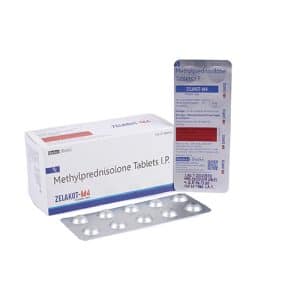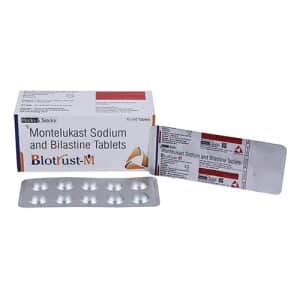Ebastine and Montelukast Tablets – This combination of Ebastine 10mg and Montelukast 10mg serves two powerful drugs in giving total relief to symptoms associated with allergic and asthma conditions. Ebastine is a member of the second-generation antihistamine, which acts by blocking histamine receptors-the blockage is further associated with a reduction in the allergic responses. Montelukast works as a leukotriene receptor antagonist by blocking substances that lead to an inflammatory reaction and constriction of the airways. Together, they help to cover both allergic and inflammatory factors of respiratory and allergic disorders.
Composition
Ebastine- 10mg
Montelukast- 10mg
Thus, these actives work by minus the effects that can be caused such as sneezing, runny nose, nasal congestion, itching, and wheezing.
How It Works
Ebastine: Just like any other second-generation H₁ receptor antagonist, Ebastine selectively blocks histamine receptors found within peripheral tissues and reduces the effects of histamine that is released whenever there is an allergic reaction. That is, such events relieve symptoms such as itching, swelling, and redness.
Montelukast: Montelukast competitively inhibits leukotriene receptors to forestall the binding of leukotrienes responsible for inflammation and bronchoconstriction. This mechanism action is beneficial in asthmatic and allergic rhinitis conditions.
Side Effects of Ebastine and Montelukast Tablets
The most common side effects may be:
- Headache
- Dry mouth
- Drowsiness
- Nausea
- Abdominal discomfort
- Fatigue
- Dizziness
- Serious side effects are rare but may include:
- Arrhythmias
- Anaphylaxis
- Abnormalities in liver enzymes
- Neuropsychiatric effects such as changes in mood, anxiety, or even depression
In case of any serious side effects, the patient should get in touch with a doctor immediately.
Precautions of Ebastine and Montelukast Tablets
Allergy: Hypersensitivity to Ebastine, Montelukast, or any part of the preparation makes it contraindicated.
Hepatic Impairment: Use with caution in patients who are experiencing hepatic impairment. Regular monitoring maybe warranted.
Pregnancy and Lactation: This medicine is not to be used during pregnancy and lactation without healthcare provider advice.
Drug Interactions: Make sure to inform your healthcare provider about all other medications being taken since interactions may occur. Montelukast has some particular interactions that raise plasma levels and also prolongs the QTc interval when combined with a particular drug.








